Related Research Articles
Racing games are a video game genre in which the player participates in a racing competition. They may be based on anything from real-world racing leagues to fantastical settings. They are distributed along a spectrum between more realistic racing simulations and more fantastical arcade-style racing games. Kart racing games emerged in the 1990s as a popular sub-genre of the latter. Racing games may also fall under the category of sports video games.

Cruis'n USA is a racing video game developed by TV Games Inc. and published by Nintendo. It was first released in arcades in 1994 by Midway Games, with a port to the Nintendo 64 developed by Williams Electronics released in 1996. It is the first game in the Cruis'n series and features races set in locations across the continental United States.

Cruis'n Exotica is a 1999 racing game developed and published by Midway Games for arcades. The game is a sequel to Cruis'n World and is the third entry in Nintendo's Cruis'n series. A port to the Nintendo 64 developed by Gratuitous Games was released in 2000, along with a Game Boy Color version developed by Crawfish Interactive.
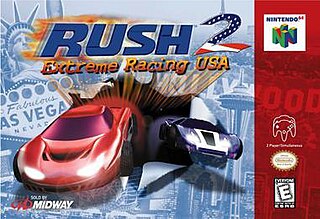
Rush 2: Extreme Racing USA is a racing video game developed by Atari Games and published by Midway exclusively for the Nintendo 64 video game console. It was released on November 11, 1998, in North America, and February 4, 1999, in Europe. Rush 2: Extreme Racing USA is a sequel to San Francisco Rush: Extreme Racing, and the second game in the Rush series.
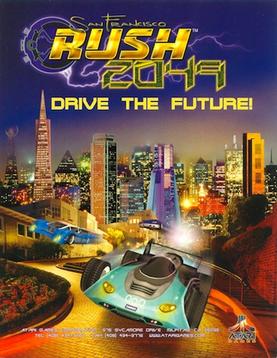
San Francisco Rush 2049 is a 1999 futuristic-themed racing video game developed and manufactured by Atari Games for arcades, later ported to home systems. It is the third game in the Rush series as the sequel to San Francisco Rush: Extreme Racing and Rush 2: Extreme Racing USA as well as the last to be set in the city of San Francisco. An updated version with fixes and more tracks was later released subtitled Tournament Edition. The game was notably also the last coin-op title rooted to the original Atari arcade business and Atari brand, 27 years after Pong.
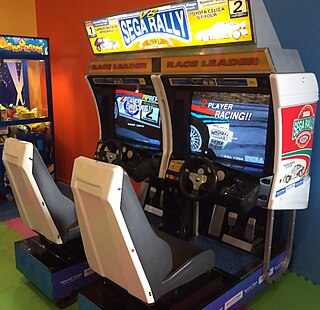
Sega Rally is a series of 3D racing video games published by Sega. The first game in the series, Sega Rally Championship, was developed by Sega AM3 and released in arcades in 1994. Later games were developed by Sega and Sega Racing Studio.

Crazy Taxi is a series of racing games developed by Hitmaker and published by Sega. It was first available as an arcade video game in 1999, then released for the Dreamcast console in 2000. It is the third best-selling Dreamcast game in the United States, selling over a million copies. The game was later ported to the PlayStation 2, GameCube, and IBM PC compatibles with sequels also appearing on the Xbox, Game Boy Advance, and PlayStation Portable systems.
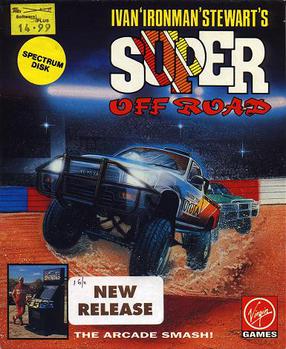
Ivan 'Ironman' Stewart's Super Off Road is an arcade video game released in 1989 by Leland Corporation. The game was designed and managed by John Morgan who was also lead programmer, and endorsed by professional off-road racer Ivan Stewart. Virgin Games produced several home versions in 1990. In 1991, a home console version for the Nintendo Entertainment System was later released by Leland's Tradewest subsidiary, followed by versions for most major home formats including the Master System, Genesis, Super NES, Amiga, and MS-DOS. A port for the Atari Jaguar was announced but never released. Some of the ports removed Ivan Stewart's name from the title due to licensing issues and are known simply as Super Off Road.
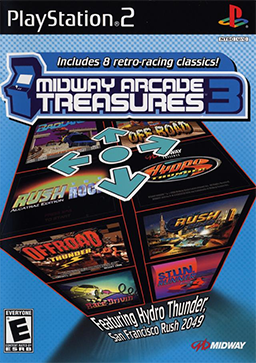
Midway Arcade Treasures 3 is the third and final compilation of classic arcade games published by Midway for the GameCube, PlayStation 2, and Xbox. This compilation includes 8 racing games that were not in the 2003 and 2004 releases Midway Arcade Treasures and Midway Arcade Treasures 2. Like the first and second installments, however, the Xbox version is not compatible with the Xbox 360. Unlike the other installments in the Midway Arcade Treasures series, it is rated E for Everyone by the ESRB. It also differs from the other installments by focusing on one specific genre, while the first two featured games from a wide variety of genres.

Hydro Thunder is an arcade inshore powerboat racing video game originally released by Midway Games in February 1999 and later released for the Sega Dreamcast as a launch title later that year. It was also released for the PlayStation and Nintendo 64 in early 2000. This game is part of Midway's Thunder series of racing games, which includes Offroad Thunder, 4 Wheel Thunder, and Arctic Thunder. Hydro Thunder Hurricane, a sequel to Hydro Thunder, was later released for the Xbox 360 on July 27, 2010 on Xbox Live Arcade.
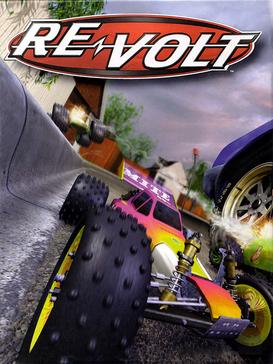
Re-Volt is a racing video game designed by Paul Phippen and Simon Harrison. It was developed by Acclaim Studios London and published by Acclaim Entertainment for Microsoft Windows, Nintendo 64, PlayStation and Dreamcast.
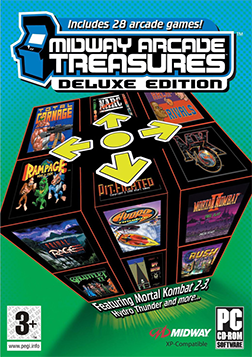
Midway Arcade Treasures Deluxe Edition is an arcade compilation released exclusively for Microsoft Windows on February 15, 2006 in North America, and on March 17 in PAL regions. It is a compilation of Midway Arcade Treasures 2 and Midway Arcade Treasures 3, which had both been previously released on consoles only. Unlike the previous two volumes, it includes the original Mortal Kombat. In the two months after its release, two official patches were released for the collection, one to fix missing music for half of the games that was accidentally left out of the shipped version, and a second one to correct a button function oversight that prevented Random Select and Smoke battle easter eggs in Mortal Kombat II. A few pieces of additional artwork for Wizard of Wor and Primal Rage were made available as supplements on the Midway website. Like the previous release, the Deluxe Edition's Primal Rage content suffered from emulation issues.

Monaco Grand Prix: Racing Simulation 2, also known as just Monaco Grand Prix or Racing Simulation: Monaco Grand Prix, is a Formula One racing game developed and published by Ubisoft for the Windows, Nintendo 64, PlayStation, and Dreamcast. It was released in 1998–1999. A sequel, Racing Simulation 3, was released in 2002.

Off Road Challenge is a video game developed and published by Midway. The game was originally released in 1997 for arcades using the Midway V Unit hardware. It is part of the Off Road series which began with Ivan 'Ironman' Stewart's Super Off Road.

Cruis'n is a series of racing video games originally developed by Eugene Jarvis for Midway Games and published by Midway and Nintendo. The series distinguishes itself from other racing games with its over-the-top presentation and fast-paced gameplay, featuring a wide variety of vehicles and tracks based on a number of real world locations. The series debuted in North American and European arcades in 1994 with the release of Cruis'n USA, which, along with Killer Instinct, was advertised as running on Nintendo's Ultra 64 hardware. Two sequels followed, Cruis'n World and Cruis'n Exotica, which featured new vehicles and tracks. All three games were released for the Nintendo 64 as well, with Exotica also being released for the handheld Game Boy Color. The next game in the series, Cruis'n Velocity deviated from the traditional arcade gameplay of the series and was released for the Game Boy Advance.
Barry Leitch is a Scottish video game music composer. His work includes the Lotus Turbo Challenge, TFX, Gauntlet Legends, Gauntlet Dark Legacy, Top Gear, and Rush video game series.
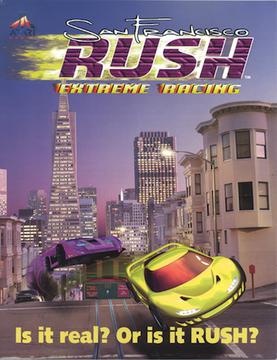
San Francisco Rush: Extreme Racing is a 1996 arcade video game developed and published by Atari Games. After appearing on arcades, it was ported to home consoles under the Midway label beginning with Nintendo 64 in 1997 and then PlayStation in 1998. An updated version named San Francisco Rush The Rock: Alcatraz Edition was later released with more tracks and cars. It was a critical and commercial hit, and became the first in the Rush series, followed up by San Francisco Rush 2049 (1999), bounded by the non-arcade Rush 2: Extreme Racing USA (1998).

Horizon Chase is a racing video game developed and published by Brazilian company Aquiris Game Studio. It was released on August 20, 2015, for iOS and Android platforms. It is a 3D game inspired by 2D, 16-bit titles like Top Gear. Its soundtrack has Nintendocore influences.